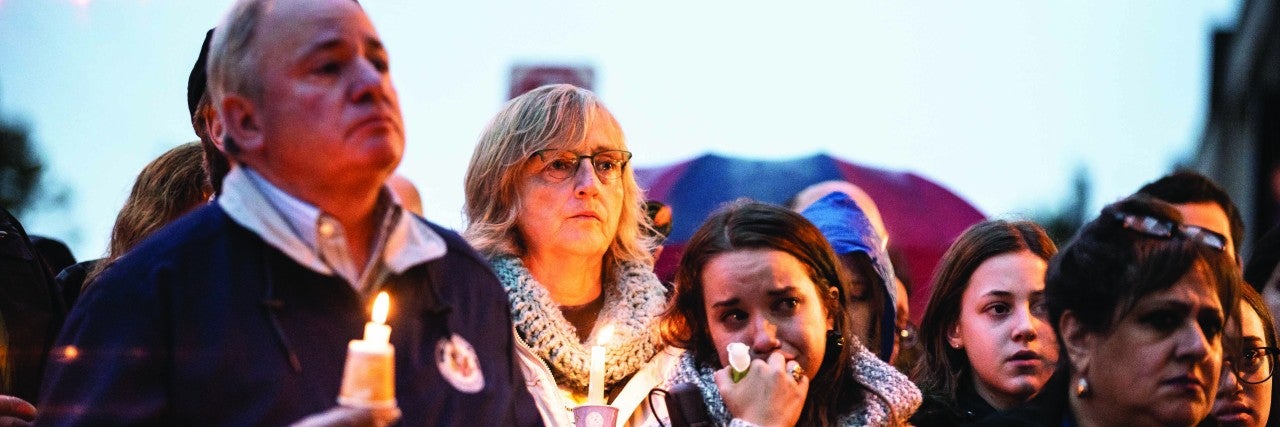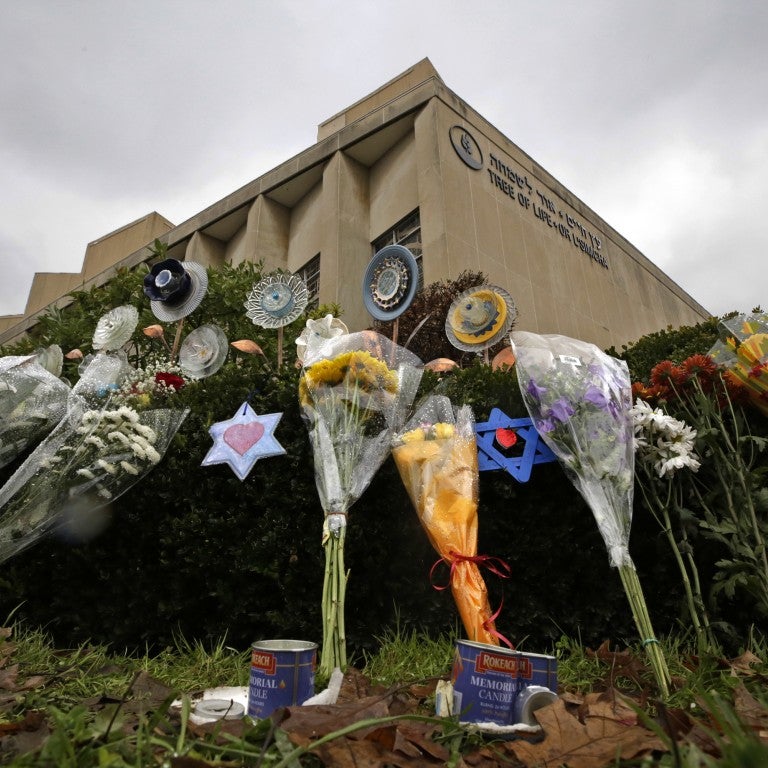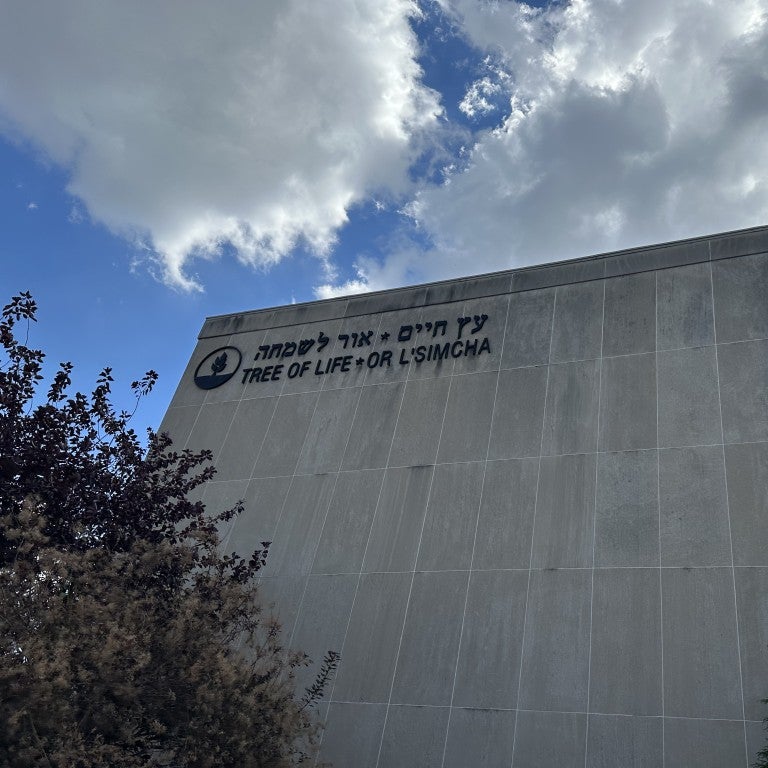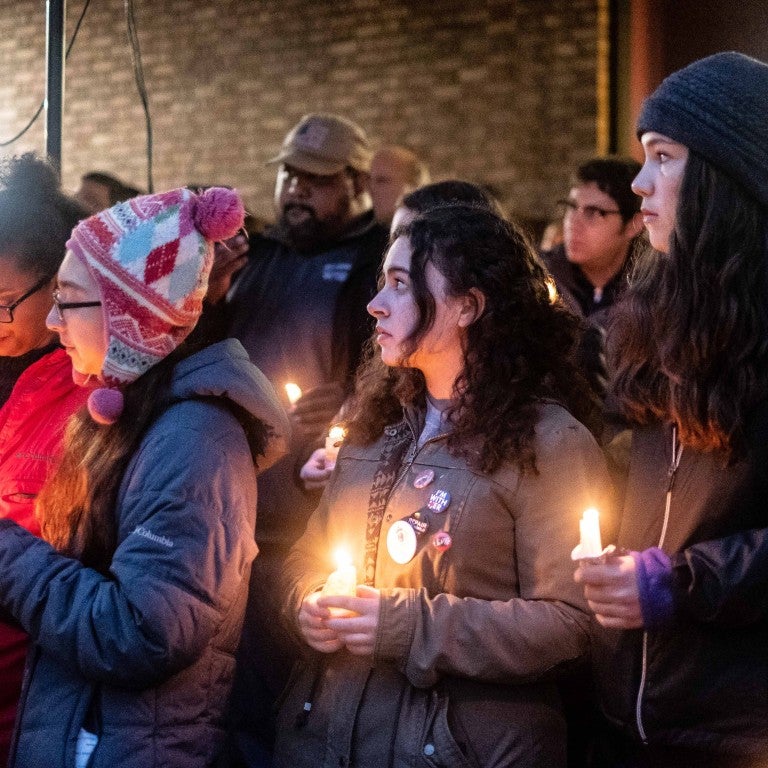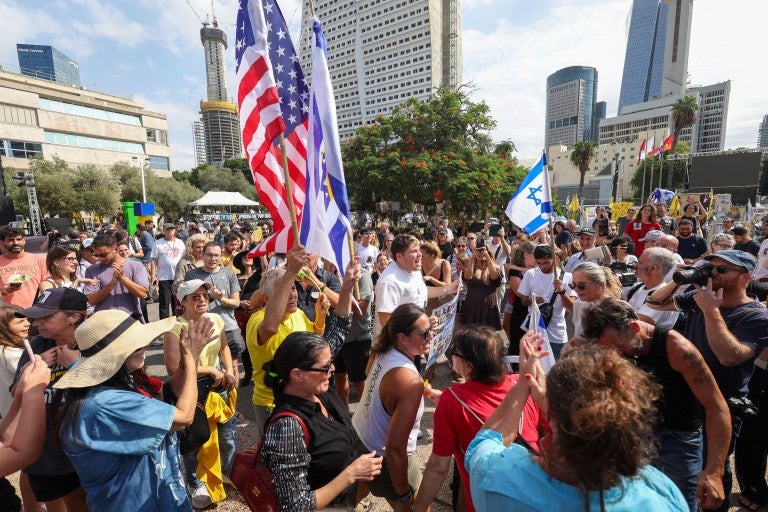October 27, 2023
AJC CEO Ted Deutch joins us to discuss the significance of the Pittsburgh synagogue shooting at the Tree of Life and its aftermath, the anniversary, and what it means to Jews around the world after the October 7 attack on Israel, when once again Jews were murdered just for being Jewish.
In the final episode of the Remembering Pittsburgh series, Ted reflects on what being Jewish in the United States feels like at this moment, and how the Jewish community is uniting to overcome yet another challenge.
*The views and opinions expressed by guests do not necessarily reflect the views or position of AJC.
Episode Lineup:
- (0:40) Ted Deutch
Show Notes:
Listen:
- Remembering Pittsburgh Part 1: Behind the Scenes at the Reimagined Tree of Life
- Remembering Pittsburgh Part 2: What the Family of Tree of Life Victim Joyce Fienberg Wants You to Know About Her Legacy
- Remembering Pittsburgh Part 3: How the #ShowUpForShabbat Campaign Drew Global Solidarity Amid Tragedy
Take Action:
Music credits:
- Hevenu Shalom - Violin Heart
- Fire Tree (Violin Version) - Axletree
Follow People of the Pod on your favorite podcast app, and learn more at AJC.org/PeopleofthePod
You can reach us at: peopleofthepod@ajc.org
If you’ve appreciated this episode, please be sure to tell your friends, and review us on Apple Podcasts.
Episode Transcript:
Manya Brachear Pashman: This month, AJC set out to mark the five-year anniversary of the Pittsburgh Synagogue Shooting at the Tree of Life with a series of episodes exploring this turning point for the American Jewish community. Our first installment aired October 5. Two days later, the Jewish people faced another unprecedented deadly antisemitic attack, this time in Israel. Synagogues stepped up security and families tamped down their fears to take their children to Hebrew school or attend Shabbat services. In the second episode of our series, we sat down with Howard and Marnie Fienberg, who paid tribute to their mother Joyce. In the third installment, we looked back at how the horror drew people to solidarity.
For this closing episode of the series, I sat down with AJC CEO Ted Deutch, who served as a congressman at the time of the Tree of Life massacre. We discussed this anniversary and its parallels to the October 7 attack on Israel, when once again Jews were murdered just for being Jewish.
Manya Brachear Pashman: Ted, where were you on the morning of October 27, 2018 when you heard about the Tree of Life?
Ted Deutch: I was a congressman who represented Parkland, where the mass shooting at Marjory Stoneman Douglas took place. And the morning of Tree of Life, I spoke to a group of high school students from all around South Florida, who participated in a program about how they can become leaders in the community. I spoke with them about what had happened a few months before in Parkland, and what I had seen from high school students in Parkland and how they responded and how you stand up to violence and try to stop it and how you respond to evil and how important it is to use the power that you have as young people. That was literally what I was doing right before I walked out of the Florida Atlantic University auditorium and saw my phone start to buzz with news of Tree of Life.
Everything that I had said to the students in the discussion, that really difficult conversation we had with these students who shared with me their fears of violence, their fears of going to school–those fears hit home really hard for me and for the Jewish community.
Manya Brachear Pashman: Did you view this as a significant turning point for the Jewish community in America or worldwide?
Ted Deutch: This was something that we dealt with in Europe, we feared, we stood AJC's stood with the Jewish community across Europe as they, as they were attacked over years. I was a member of Congress when we had vigils with the ambassadors from European countries, in memory of lives lost, Jewish lives lost as a result of antisemitic attacks. And here, that morning is a turning point for all of us in the Jewish community, and how we respond, how we view the threat of antisemitism now as a deadly threat to the Jewish community in America, and for the rest of America to see another example of what happens when antisemitism, hatred are running rampant and where it can lead and how dangerous it is.
Manya Brachear Pashman: From your vantage point as a congressman, what shifted on Capitol Hill, if anything, after October 27?
Ted Deutch: Well, I was a member of Congress, but I focused so much of my work on the Jewish community. And we had started a Bipartisan Task Force to Combat Antisemitism in response to what happened in Europe. We never could have imagined something like that happening in our own country, especially in this place. I mean, this is the most idyllic, suburban, lovely neighborhood. I mean, it is, as everyone knows, it is literally Mr. Rogers Neighborhood, right? He lives just a stone's throw from Tree of Life. And so our work became that much more urgent.
And we immediately refocused our efforts and those of us who were committed to fighting antisemitism, to ways that we could ensure the security of the Jewish community, and we immediately started looking at ways to find additional funding for security and and we dug deep into FBI reporting and research into what else is out there and what else they're tracking and what the fears are. And, unfortunately, whether in Congress, now at AJC, that hasn't stopped since.
Manya Brachear Pashman: Did the members of Congress who are not Jewish respond differently?
Ted Deutch: There was real support, and support not just for me and my fellow Jewish members, but for the Jewish community overall. Lots of members of Congress, most, know the Jewish community, many of them have Jewish communities they focus on in their own districts, sometimes large, sometimes very small. But the security concerns became real for every one of them – whether they had a large thousand-family congregation in a major city or a tiny synagogue somewhere in a remote part of the country, everyone felt it, everyone was put on edge, and every member of Congress felt an obligation to respond to that.
I just remember having conversations with colleagues who were people of faith, who went to church. They were so struck by the fact that they came and went every Sunday, walked into their churches, doors were wide open. And the contrast to synagogues where you really need to be committed in so many places to get in so many places to go to synagogue, because you have to go through security, and sometimes you have to check in with the police, and in some places, you have to go through metal detectors. That really, really hit them and I think continues to, especially now.
Every time something happens in Israel, we see a need for greater security at home. In the aftermath of the horrific attack by Hamas. It’s affected Jews, obviously in Israel and around the world and how we view Israel, but we all fear for what could happen in the United States.
Manya Brachear Pashman: You left your job on Capitol Hill and became CEO of AJC just last year. I’m curious whether the horror in Pittsburgh so soon after the Parkland shooting was an inflection point for you and your path?
Ted Deutch: I wasn't thinking about leaving Congress. But when a friend reached out and asked if I'd be interested in being considered for the AJC job, I started reflecting upon the issues that I worked on, and what I had been through. And this fits into a very specific part of that thinking it was. It was the whole series of what happened, the shooting at Stoneman Douglas, and the impact that that had on the community. Then almost in immediate succession, quick succession, this horrific shooting at Tree of Life. First, there was the trauma in our own community, then there was the real trauma in the broader Jewish community. And then, not that they're directly related, but on January 6, when I was sitting in my office with the lights off, and my electronics silenced as the Capitol Police told us to do, and I was sitting in a dark cubicle in our staff office … watching what was happening in the Capitol and listening as people ran by my office and not knowing who they are. Everything was, everyone was so concerned about violence that day and my first thought that day was how grateful I was that I had just moved into this new office and had not yet had an opportunity to hang my mezuzah.
And, right, so where does this fit in? I didn't decide to come to AJC because of some series of traumatic events. But just in terms of a turning point for me, what happened at Tree of Life and how that informed the remainder of my time and I was in Congress and the way I thought about my work, and, and then those fears on January 6, and realizing again, how at risk I felt even in the U.S. Capitol as a Jew. I suppose there is probably a straight line that I didn't see that started that day that led me to where I am now.
Manya Brachear Pashman: So, you’ve been here a year now. How have these events shaped your work since you arrived?
Ted Deutch: AJC's is to enhance the well-being of the Jewish people in Israel, and to advance democratic values. If we go back to Tree of Life, and think about what's transpired since and the rise in antisemitism as we saw it around the country, and on social media, and the many ways that the community has felt at risk.
The week I started, Kanye West went on his antisemitic rampage on social media on Twitter. The Jewish community is not well if antisemitism is running rampant. So it's why we worked so hard with the White House, it's why we encouraged them to create a national strategy. It's why we brought in special envoys from around the world to meet with the White House to help inform the process. It's why we celebrated the release of the National Strategy to Combat Antisemitism and put together, really devoted a large part of our resources over the past six months, helping to implement the national strategy. And it's why we continue across the country here to look for ways to engage further in fighting antisemitism. By strengthening the relationships we have with others–it’s why we're doing so much more in our intergroup work and interreligious work.
I just recently visited a new Hindu temple in New Jersey, I think it's the largest, certainly the largest in the United States, one the largest in the world. And it was really meaningful to spend the afternoon with leaders of the Hindu community who, who very much recognize that in many ways our fates in America are intertwined.
Manya Brachear Pashman: So in our first episode of this series, our producer Atara Lakritz and I went on the last tour of the Tree of Life building. You also walked through the building back in June, before many of the artifacts had been removed. Would you mind reflecting on that experience?
Ted Deutch: When I walked up to the synagogue, I couldn't help but think of my synagogue where I grew up on the other side of Pennsylvania in a lovely community, like Pittsburgh. I was struck that, forget that this was a synagogue, I really couldn't stop thinking that it was inconceivable that that kind of horrible tragedy could happen in a community like that.
And walking through the synagogue and seeing the site where hatred, and antisemitism, and manifestations, the worst manifestations of antisemitism were brought to this lovely place, in this wonderful synagogue. It was overwhelming to think about what was happening that Shabbat and the fear and terror that people felt as that was happening. That was number one.
Secondly, I walked into the main auditorium where they were gathering all of the things that hadn't yet been taken away to be used in the museum and the memorial that's going to be constructed, that haven't been given back to families.
There were lots of things that are just not identified, they don't have families to return them to. And to see tallaisim and tefillin and all kinds of items that are used for Jewish rituals and Jewish customs just sitting on this table where they didn't know what they were going to do with them because the synagogue that existed there, the life that existed there, that simple, wonderful community, that was gone. It was gone.
That community will never be the same. And I think for our community, for the Jewish community, we're really never gonna be the same after what happened there.
Manya Brachear Pashman: You were telling me before we started this conversation that they gave you something during your visit.
Ted Deutch: As I walked through, and they saw how moved I was by this massive display. They came over and made such a kind gesture to me. And of all of the gifts that I've received in all of my travels, as a member of Congress, and now as CEO of AJC, I don't think there's anything that’s as meaningful as the tefillin that they gave me.
I don't know, obviously, I don't know whose it was. And it may well have been someone that was a synagogue member years and years ago. But the connection that I felt at that moment to that community at Tree of Life and the connection that I felt thinking about, not just Tree of Life, but tragedies that have befallen the Jewish people throughout our history.
And knowing that I was going to return to New York, I was going to have the opportunity to join the Jewish community around the world in overcoming these tragedies, and making sure the world understands why these kinds of attacks will never, they'll never work, they'll never, they'll never defeat the Jewish community. As we endure this really challenging time now in Israel, I've been thinking the same thing.
We've gone through a lot in our history, and we've constantly, constantly overcome, and have grown and have learned and have continued to enrich the world. As Tree of Life rebuilds and will help shape a national and international conversation for years to come about fighting antisemitism. And as we continue to do our work and as Jews around the country and around the world go through whatever security measures they have to to go to synagogue and to drop their kids at day school and Hebrew school and for people to show up for programs at the JCC, there is a defiance that I felt at that moment that is perhaps the most important thing I took away from that day.
Because it was awful. But I'm not going to dwell on how terrible it was. We're going to think about every way we can to honor the memories of the lives that were taken, and to strengthen the Jewish people in their memory as we go forward.
Manya Brachear Pashman: We planned this series and invited you to speak before the October 7th terrorist attack in Israel and the war with Hamas that has unfolded since. At first we wondered whether we should even proceed with this series. How could we focus on anything other than Israel at this moment? Of course, the parallels between the Tree of Life and October 7th are all too stark– Jews are once again being targeted simply because they are Jewish. Can you share your thoughts on this difficult moment for the Jewish people?
Ted Deutch: That sense of unease that all of us felt when we heard that story, like how could that possibly happen in the United States, really, it's an unease and fear that we feel when we've watched what's happened in Israel and when a horrific and brutal and barbaric attack takes place against our family, our brothers and sisters in Israel, we feel that here, and especially when it was, it was unthinkable what happened with this Hamas attack. Just as somebody shooting up a synagogue was unthinkable in America, it again, it puts us on edge, and it makes us redouble our efforts. Not just to fight antisemitism, but to really bring the community together.
What I've really been proud of since this terrible time in Israel began is the way that AJC has responded, not just in putting out meaningful information to help people get the facts and get through this, and to fight back against lies. But the way that we've really worked to bring the community together.
There are 16 million Jews in the world, out of eight and a half billion people we need to stick together. Moments like Tree of Life remind us of that, and what's been happening in Israel absolutely reminds us of that. That informs so much of what AJC does, and has done in response to Tree of Life and certainly is doing in response to the current situation.
